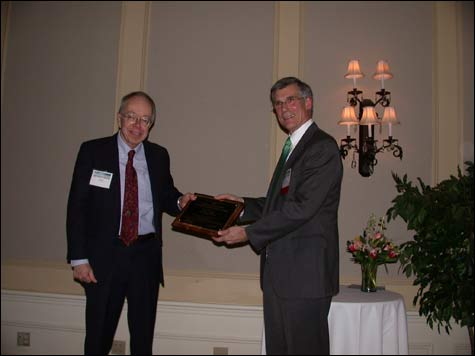
HANDOFF: Lance Tapley (left) is honored by Peter LaFond, president of the bar and an assistant attorney general. |
Portland Phoenix freelancer Lance Tapley was given the Maine State Bar Association's Excellence in Legal Journalism Award last week at the association's annual meeting.The following is his acceptance speech.
Thank you very much. I’m very grateful.
Journalism is a team effort, so I want to accept, too, on behalf of my excellent and courageous editors at the Phoenix: Jeff Inglis, Peter Kadzis, and Clif Garboden, and my former editor Sam Pfeifle. I want to thank Ron Huber, of Rockland, for putting me onto this story. I especially want to thank Deane Brown, Michael James, and many other prisoners. They put it on the line. Deane Brown was shipped out of state for being candid. Former prisoners helped me, as well. Ray Levasseur has been my technical consultant on solitary confinement.
I want to dedicate these brief words to Ryan Rideout. Ryan was a mentally ill man who committed suicide last October in the Supermax because of the prison’s negligence. It’s time to stop the abuse that led to his death. I want to enlist you in this cause.
I consort with criminals. Why would such an establishment group as the Maine State Bar Association give me an award? Then I realized that lawyers also consort with criminals. There are several members of the bar I want to thank for their help: defense attorneys Joe Steinberger, Barry Pretzel, Lynne Williams, and Andy Campbell.
In covering this story, I gained a new respect for defense attorneys. I suspect many of them have learned what I have about criminals and prisoners.
First, prisoners are the ones who’ve been caught.
Second, there but for the grace of God go I — or, for that matter, you.
Third, I’ve learned that redemption is possible. Once these human beings have paid their “debt to society,” as they used to say in the movies, they should be given as much opportunity as possible. We should try to forgive them. We don’t.
I’ve learned about governmental cruelty, for which we are all responsible. It is criminal to abuse criminals.
In covering this story, I’ve come to have less reverence for the high and mighty, the officials — up to the highest — who preside over Maine’s Supermax, where cruelty is institutional.
Presiding officials get away with a lot. They’re often among those who don’t get caught. All societies exalt the winners, even when they don’t deserve it.
The prisons are filled with the losers: the mentally ill, the very poor, the victims of racism or sexual abuse, the mentally less able. When I say “loser,” I mean to honor these people. Despite their responsibility for their crimes, despite the suffering of their victims, we have to recognize their suffering, and never give up on their rehabilitation.
Two-thirds of prison inmates are mentally ill. Recently in the New York Times, a law professor explained how this came to pass — to quote — ”Over the past 40 years, the United States dismantled a colossal mental health complex and rebuilt — bed by bed — an enormous prison.”